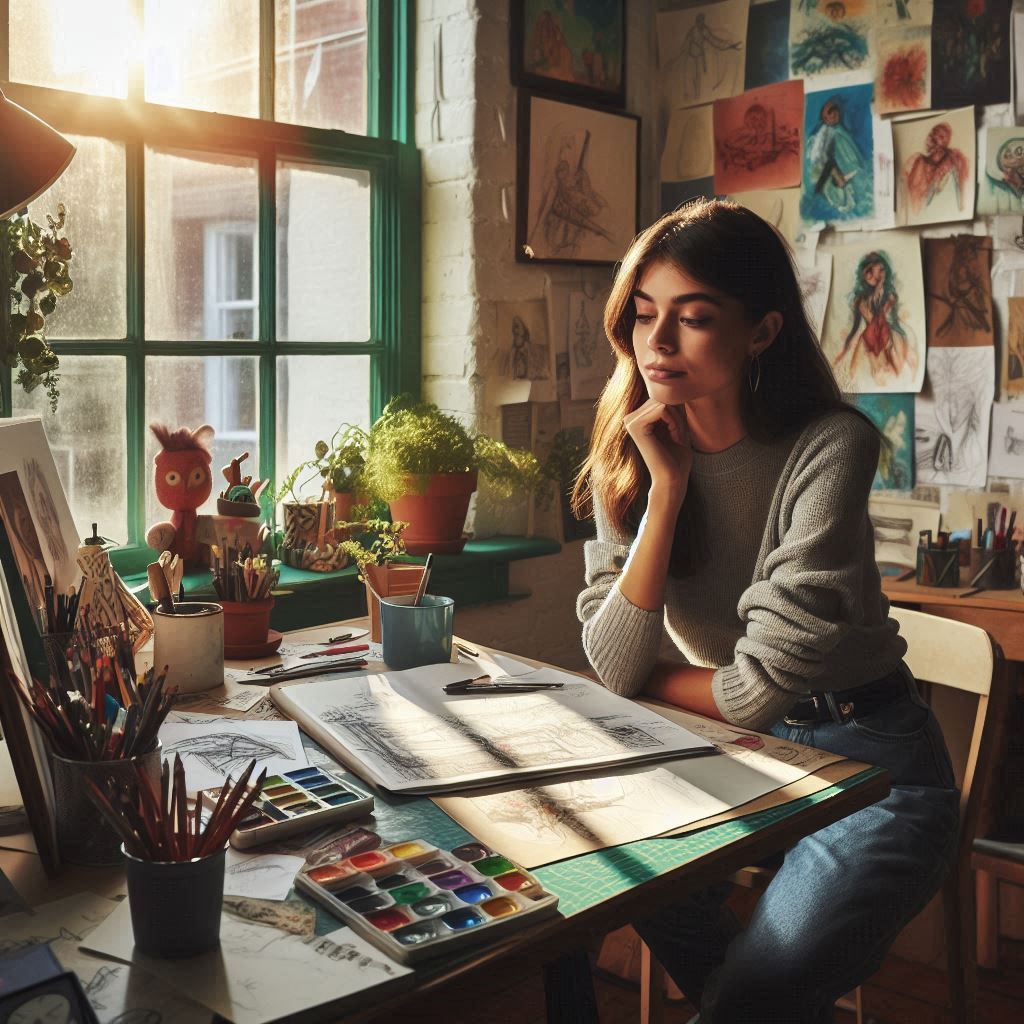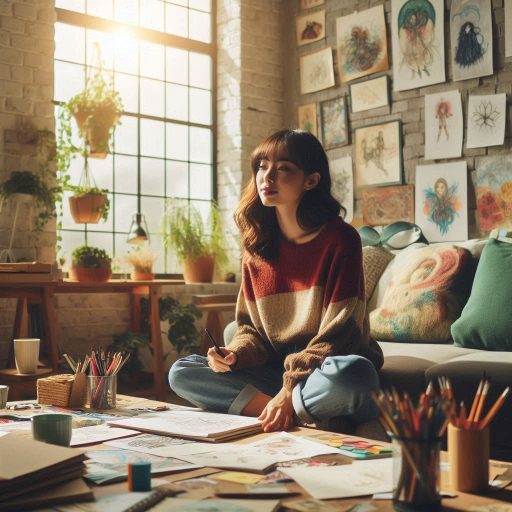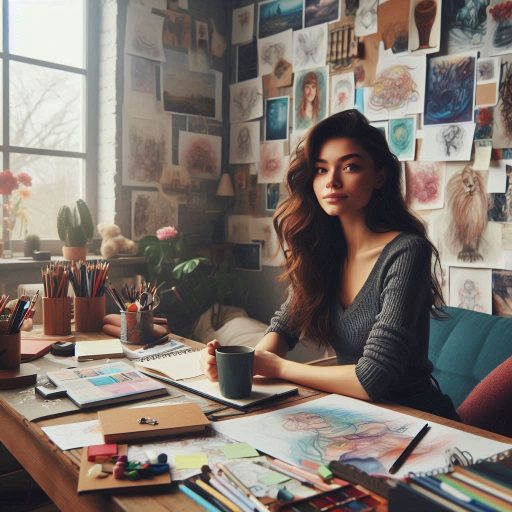Introduction
A concept artist is a creative professional who visualizes ideas and concepts through art.
They play a crucial role in various industries, including film, gaming, and advertising.
Concept artists translate written ideas into visual representations, helping to establish the overall aesthetic and direction of a project.
In film, they design characters, environments, and props, creating a visual foundation for production.
Concept artists develop immersive worlds and engaging characters that enhance player experiences in gaming.
In advertising, they create captivating visuals that communicate brand messages effectively.
The importance of concept artists cannot be overstated.
Their work helps shape narratives and influences the audience’s perception of a project.
As the demand for high-quality visual content continues to rise, the job market for skilled concept artists is also growing.
Industries are constantly seeking talented individuals who can bring innovative ideas to life.
This high demand creates numerous opportunities for aspiring concept artists to build successful careers in diverse creative fields.
By understanding the importance of their role, artists can appreciate the impact they have on shaping visual storytelling across various mediums.
Strong Drawing and Illustration Skills
Importance of being proficient in traditional drawing and illustration techniques
A successful concept artist must possess strong drawing and illustration skills.
This foundation is crucial in creating compelling visual stories.
Mastering traditional drawing techniques allows artists to explore creative ideas with confidence and precision.
It also ensures that they can effectively translate abstract concepts into clear, visual narratives.
Proficiency in traditional drawing provides a deeper understanding of forms and structures.
Whether sketching characters, environments, or objects, artists need to visualize these elements accurately.
This skill is essential in industries like film, video games, and animation, where concept artists play a pivotal role in bringing ideas to life.
Ability to effectively convey ideas and concepts through visual storytelling
Being proficient in traditional illustration also aids in effective visual storytelling.
A concept artist‘s role is to communicate ideas through art, and strong drawing skills make this possible.
With clear and well-executed drawings, they can convey mood, emotion, and narrative in a single frame.
Visual storytelling is key in captivating audiences and ensuring the narrative flows seamlessly from concept to final product.
Additionally, visual storytelling allows for flexibility in creative environments.
Concept artists often need to adapt quickly to changes in direction or design.
Strong drawing skills enable them to iterate designs rapidly while maintaining high-quality work.
This ability to revise and improve upon ideas is crucial for success in fast-paced industries.
Need for a strong foundation in anatomy, perspective, and composition
A strong grasp of anatomy, perspective, and composition enhances a concept artist‘s work.
Anatomy is essential when designing characters, ensuring realistic and proportionate body forms.
Without this understanding, figures can appear distorted, breaking the immersion in the design.
Perspective is equally important for creating believable environments and dynamic scenes.
Whether crafting vast landscapes or intimate interior spaces, perspective gives depth and dimension to the artwork.
Composition, another critical element, guides the viewer‘s eye through the image.
It helps direct attention to the most important aspects while ensuring balance and harmony.
Concept artists who excel in composition can create images that are not only visually pleasing but also communicate the intended message clearly.
Mastery of anatomy, perspective, and composition also offers versatility.
Artists who understand these principles can confidently work on a wide range of projects, from character design to environmental illustrations.
They can quickly sketch ideas, iterate designs, and make necessary adjustments without sacrificing quality.
Strong drawing and illustration skills, combined with a solid foundation in anatomy, perspective, and composition, are essential for any successful concept artist.
These skills allow artists to convey ideas effectively, create dynamic visuals, and stand out in a competitive field.
Read: Visual Merchandising: Best Practices for Beginners
Knowledge of Digital Tools and Software
Necessity of being proficient in digital art software such as Photoshop, Illustrator, and Procreate
To succeed as a concept artist, proficiency in digital art software is essential.
Tools like Photoshop, Illustrator, and Procreate are industry standards for creating high-quality artwork.
These programs provide a wide range of features, enabling artists to create complex and polished designs efficiently.
Mastery of these tools allows concept artists to work faster and produce more refined results, which is crucial in fast-paced creative industries.
Photoshop is widely used for its versatility, allowing for both detailed illustrations and quick mock-ups.
Illustrator, on the other hand, excels in creating vector-based designs that maintain quality at any scale.
Procreate, popular on iPads, offers mobility and a user-friendly interface for artists on the go.
Concept artists who can confidently use these digital tools can quickly translate their ideas into professional, presentable art.
Importance of staying updated with the latest digital tools and techniques
Staying updated with the latest digital tools and techniques is equally important.
The digital art landscape evolves rapidly, with new software features, plugins, and techniques constantly emerging.
Concept artists who keep up with these advancements can enhance their creative processes and stand out in the competitive industry.
Learning new techniques often leads to more innovative designs, as artists can experiment with fresh approaches and workflows.
In addition, updated skills ensure compatibility with clients and teams using the latest software.
As industries adopt newer tools, concept artists must remain proficient in current software versions.
This adaptability not only improves efficiency but also demonstrates a commitment to staying relevant in a constantly changing field.
Advantage of being able to work efficiently in a digital environment
Working efficiently in a digital environment provides concept artists with a significant advantage.
Digital tools offer features like layers, filters, and customizable brushes that speed up the creative process.
With these capabilities, concept artists can make quick edits, experiment with different design elements, and create multiple iterations without starting from scratch.
This flexibility is invaluable when working with clients or teams who require fast revisions and updates.
Efficiency in a digital workspace also opens up collaboration opportunities.
Many digital art programs allow for real-time collaboration, making it easier to share progress, gather feedback, and work with others on large projects.
A concept artist must have strong knowledge of digital tools and software to succeed in the industry.
This digital proficiency not only enhances their ability to create high-quality work but also ensures they remain competitive and adaptable in a rapidly evolving field.
Read: Visual Merchandiser: Job Market and Opportunities
Creativity and Imagination
The importance of having a vivid imagination and creative vision
Creativity and imagination are the core of any successful concept artist.
A vivid imagination fuels the creation of compelling and unique designs that captivate audiences.
Concept artists must visualize ideas beyond the ordinary, taking abstract concepts and turning them into visually striking images.
Having a strong creative vision enables artists to develop characters, environments, and objects that tell stories and evoke emotions.
Imagination plays a vital role in bringing projects to life.
Whether working on films, video games, or advertisements, concept artists need the ability to craft original and engaging worlds.
Their imagination breathes life into each design, making the final product not only aesthetically pleasing but also deeply meaningful.
Without this creative spark, designs may lack the depth needed to stand out in a crowded market.
Ability to think outside the box and come up with innovative ideas
Thinking outside the box is essential for concept artists.
In an industry driven by creativity, innovation is key.
Successful concept artists continuously push boundaries, exploring new ideas and techniques that set their work apart.
The ability to break away from conventional thinking leads to fresh, unexpected designs that surprise and inspire audiences.
When working on projects, concept artists are often tasked with solving creative challenges.
They may need to design something entirely new or find unique ways to depict familiar themes.
Being able to think creatively and come up with unconventional solutions is a valuable skill.
Concept artists who can offer innovative ideas become assets to their teams, as they help drive the creative process forward with fresh perspectives.
Importance of being able to conceptualize and visualize abstract concepts
A concept artist must also be skilled at conceptualizing and visualizing abstract ideas.
Clients and directors often present vague or broad concepts that need to be visually interpreted.
The ability to take these ideas and transform them into clear, compelling visuals is essential.
Concept artists must bridge the gap between imagination and reality, creating artwork that captures the essence of an idea while remaining grounded in practicality.
This skill allows concept artists to communicate complex ideas effectively.
Whether designing futuristic cities, mythical creatures, or intricate machinery, artists must present their ideas in a way that others can understand.
Strong visualization skills help ensure that their designs are not only creative but also align with the project’s overall vision.
A concept artist‘s ability to take abstract thoughts and turn them into visually coherent designs is critical in all stages of production.
Creativity and imagination are fundamental to the success of any concept artist.
Having a vivid imagination, thinking outside the box, and the ability to conceptualize abstract ideas are essential for producing innovative and engaging designs.
These qualities not only set concept artists apart but also ensure that their work continues to inspire and push creative boundaries in their respective fields.
Read: Essential Skills for Aspiring Costume Designers
Strong Communication Skills
Need for effective communication with clients, colleagues, and art directors
Strong communication skills are essential for a successful concept artist.
Concept artists often collaborate with clients, colleagues, and art directors to bring creative visions to life.
Being able to clearly communicate ideas and design intentions ensures that everyone involved in the project understands the goals and expectations.
Effective communication helps avoid misunderstandings, keeps projects on track, and strengthens teamwork.
When working with clients, a concept artist must be able to discuss creative concepts and align their work with the client‘s vision.
Art directors and colleagues also rely on the concept artist‘s ability to explain design choices, making sure every element of the artwork fits into the broader project.
Without clear communication, even the most talented artist can struggle to meet the project’s objectives.
Ability to present ideas clearly and concisely
Presenting ideas clearly and concisely is another crucial skill for concept artists.
Whether in meetings, emails, or presentations, being able to articulate design choices helps others understand the reasoning behind creative decisions.
A concept artist should be able to explain their design process, offer insights into the choices they’ve made, and effectively pitch ideas that align with the project’s goals.
Clear communication allows artists to justify their work while also showing their creative thinking.
Concept artists are often tasked with pitching their designs to clients, and concise presentations can leave a lasting impact.
If the artist struggles to explain their concept, the value of their work might be lost.
Therefore, being able to present ideas in an organized and persuasive manner can make a significant difference in how their work is received.
Importance of being able to take and incorporate feedback
Taking and incorporating feedback is another critical aspect of communication for concept artists.
Projects often go through multiple iterations, and constructive feedback plays a major role in refining designs.
Concept artists must be open to receiving criticism and use it as a tool for improvement.
The ability to listen carefully and adjust designs based on feedback is key to success in the creative industry.
Being receptive to feedback also demonstrates professionalism and adaptability.
Whether it‘s feedback from a client or an art director, a concept artist needs to incorporate suggestions without losing sight of the overall creative direction.
This skill not only ensures that the final design aligns with the project‘s vision but also shows that the artist is a team player, ready to collaborate and improve the work.
Strong communication skills are vital for concept artists.
Effective communication with clients, colleagues, and art directors ensures that projects run smoothly and meet creative goals.
The ability to present ideas clearly and incorporate feedback shows professionalism and helps artists refine their work.
Without these skills, a concept artist may struggle to succeed in an industry where collaboration and clarity are key.
Read: Famous Costume Designers in Hollywood

Ability to Work Under Pressure
The fast-paced nature of the concept art industry
The concept art industry is fast-paced and demands quick turnaround times.
Whether working in film, video games, or advertising, concept artists must adapt to tight schedules.
Deadlines can change frequently, and artists are often expected to produce high-quality work in a short amount of time.
This fast-paced environment requires artists to stay focused and productive while handling constant pressure.
The ability to work efficiently in this demanding atmosphere is crucial for success.
Concept artists need to maintain creativity while balancing the expectations of clients and directors.
Being able to perform under pressure sets exceptional concept artists apart, as they can meet demands without sacrificing the quality of their designs.
The importance of being able to meet tight deadlines and handle multiple projects simultaneously
Meeting tight deadlines is a common challenge for concept artists.
Projects often require multiple revisions, and unexpected changes can add further pressure.
Successful concept artists are skilled at managing their time effectively to meet these tight deadlines.
They can work quickly without compromising on the creativity or detail in their artwork.
The ability to deliver consistently on time is essential for building a strong reputation in the industry.
In addition to deadlines, concept artists frequently juggle multiple projects at once.
They may be tasked with working on different aspects of a single project or working on various projects simultaneously.
Balancing these demands requires both mental agility and organizational skills.
Artists who can manage multiple responsibilities while staying productive are invaluable assets to any creative team.
Need for strong time management and organizational skills
Strong time management and organizational skills are vital in handling the pressures of the concept art industry.
Concept artists must prioritize tasks, set realistic goals, and allocate time efficiently.
These skills help them maintain focus and prevent feeling overwhelmed when managing multiple projects or working under tight deadlines.
Effective time management ensures that each task gets the attention it deserves, allowing artists to maintain high standards of work.
Organization is also key to managing the various elements of a project.
Concept artists often work with large amounts of visual data, from sketches and drafts to final designs.
Keeping track of these materials, knowing which version of a design is current, and staying organized in a fast-moving environment are critical.
This level of organization allows for quick adjustments and efficient revisions, which are common in the creative process.
The ability to work under pressure is a vital skill for concept artists.
The fast-paced nature of the industry, combined with tight deadlines and multiple projects, demands resilience and adaptability.
Transform Your Career Today
Unlock a personalized career strategy that drives real results. Get tailored advice and a roadmap designed just for you.
Start NowCollaboration and Teamwork
Importance of collaborating with other artists, designers, and professionals in the industry
Collaboration is essential for a successful concept artist.
In most projects, concept artists don‘t work in isolation; they collaborate with other artists, designers, and professionals across different departments.
Whether in animation, gaming, or advertising, teamwork is a key aspect of bringing a vision to life.
Concept artists must share ideas, offer input, and align their work with the broader creative goals of the project.
This ability to collaborate ensures that the final product is cohesive and aligned with the director‘s vision.
Collaboration provides fresh perspectives, helping artists refine their designs and reach their full potential.
The best ideas often emerge through this collective brainstorming process.
Ability to work well in a team setting and contribute to a shared vision
The ability to work well in a team setting is crucial for concept artists.
Every project involves a shared vision, and it‘s essential for artists to align their individual contributions with the collective goals.
A concept artist who collaborates effectively can adapt their personal style to meet the needs of the project while also providing creative solutions.
In team settings, communication and compromise are necessary to ensure smooth project progression.
Being able to contribute to a shared vision fosters a sense of unity and drives the project toward success.
Concept artists who work well with others are often more productive, as they benefit from open dialogue and constructive feedback.
Collaboration within a team often leads to more innovative results, as ideas build upon each other.
Concept artists who excel in teamwork ensure that their designs are not just visually compelling but also meet the project’s requirements.
The advantage of being able to adapt to different working styles and personalities
The ability to adapt to different working styles and personalities is another valuable trait for concept artists.
Every team member may have a unique approach to creativity, deadlines, and communication.
Successful concept artists are flexible and open-minded, allowing them to navigate different work environments smoothly.
By understanding and respecting their colleagues‘ working styles, they can create a positive and productive atmosphere.
Adapting to diverse personalities also enables artists to manage conflicts or disagreements more effectively.
Instead of being rigid in their approach, they listen to feedback and adjust accordingly, maintaining harmony within the team.
Being adaptable shows professionalism and increases the likelihood of producing work that resonates with the entire team, ultimately leading to a better final product.
Collaboration and teamwork are essential for concept artists.
Working closely with other professionals, contributing to a shared vision, and adapting to different working styles enhance the creative process.
Industry Knowledge and Trends
Importance of Staying Informed About Current Trends and Developments in the Industry
Staying informed about industry trends is crucial for concept artists.
The art world constantly evolves, introducing new techniques, styles, and technologies.
Artists must keep up with these changes to remain competitive in the market.
Following industry news, art blogs, social media, and online forums helps artists stay connected.
Engaging with other professionals allows artists to learn about emerging trends and practices.
Understanding current trends enables artists to create fresh, innovative work that resonates with audiences.
This knowledge gives artists an edge when collaborating with clients and teams.
Clients seek cutting-edge designs that reflect contemporary styles and preferences.
Artists who stay updated can offer timely and tailored solutions.
Being well-informed helps artists build strong reputations in the industry.
When artists know the latest developments, they can effectively pitch their ideas and concepts.
Furthermore, familiarity with trends can lead to exciting collaborations with other creatives.
Networking within the community often opens doors to new opportunities.
Need for a Solid Understanding of Different Art Styles, Genres, and Techniques
Concept artists must possess a solid understanding of various art styles, genres, and techniques.
Mastering different approaches enables artists to tackle a wider range of projects.
From fantasy and sci-fi to realism and abstract themes, versatility is essential in this field.
This flexibility opens up opportunities in multiple creative domains, such as video games, film, and animation.
Concept artists should be comfortable adapting their skills to fit different project requirements.
Blending traditional and modern techniques enhances an artist’s creative output and broadens their artistic toolkit.
The more techniques an artist masters, the more valuable they become in the industry.
Understanding diverse genres enriches an artist’s creative approach and allows for more comprehensive storytelling.
This depth of knowledge helps artists convey complex ideas visually and capture the essence of different themes.
Ultimately, a well-rounded skill set enables artists to elevate their work.
Advantage of Being Able to Adapt to Changing Market Demands and Preferences
Adapting to changing market demands is vital for concept artists.
Consumer tastes and industry requirements frequently shift, and artists must be ready to evolve alongside these changes.
For example, the rise of virtual reality technology demands new design skills and approaches.
Artists proficient in current techniques and trends will find more opportunities.
Understanding when certain styles trend helps artists tailor their portfolios to meet market needs.
Artists who embrace new trends often produce innovative work, experimenting with fresh ideas and pushing boundaries.
This adaptability enhances their artistic voice and strengthens their portfolios.
Ultimately, artists who prioritize industry knowledge and trend awareness can navigate a rapidly evolving landscape.
This commitment ensures their creativity flourishes and secures long-term success in the industry.
Find Out More: Landscape Architecture Licensure: What You Need
Delve into the Subject: How to Create Engaging Landing Pages
Conclusion
Several key skills are essential for a successful concept artist.
Strong drawing and illustration skills form the foundation for conveying ideas visually.
Proficiency in digital tools and software enhances efficiency and creativity.
Creativity and imagination allow artists to think outside the box and innovate.
Strong communication skills facilitate collaboration with clients and colleagues.
The ability to work under pressure ensures that artists meet tight deadlines.
Collaboration and teamwork foster a shared vision among creative professionals.
Finally, staying informed about industry knowledge and trends helps artists adapt to changing demands.
Continuously developing and honing these skills is crucial for long-term success.
The creative industry is constantly evolving, and artists must keep pace with new techniques and tools.
Aspiring concept artists should actively pursue opportunities for growth, whether through workshops, courses, or networking events.
Engaging with other professionals and seeking feedback can further enhance their skills.
By investing time in learning and improvement, artists can build a successful and fulfilling career in concept art.
Embrace the journey and stay committed to personal and professional growth in this dynamic field.
[E-Books for Sale]
The Big Book of 500 High-Paying Jobs in America: Unlock Your Earning Potential
$19.99 • 500 High-Paying Jobs • 330 pages
Explore 500 high-paying jobs in America and learn how to boost your career, earn more, and achieve success!
See All 500 High-Paying Jobs of this E-Book
1001 Professions Without a Degree: High-Paying American Jobs You Can Start Now
$19.99 • 1001 Professions Without a Degree • 174 pages
Discover 1001 high-paying jobs without a degree! Unlock career tips, skills, and success strategies for just $19.99!




